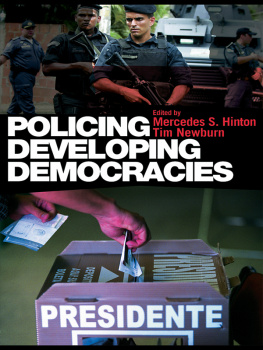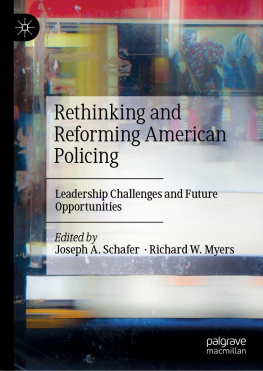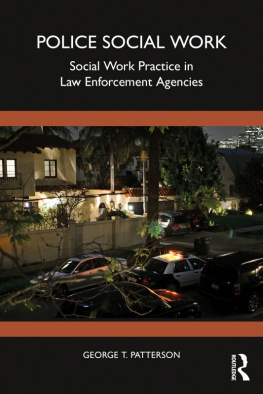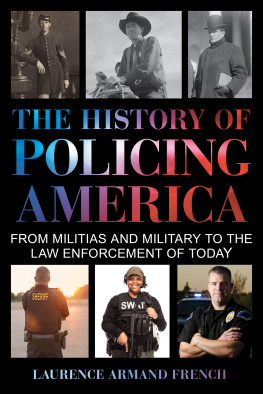Policing Developing Democracies
There is now a very considerable and varied body of literature exploring the nature, style, tactics, make-up and impact of policing. Indeed, arguably, this is the largest sub-area of criminological scholarship. However, as is true of the subject more generally, policing literature has been dominated by research and writing from the United States and the Anglophone world and has tended to focus on the police forces in those parts of the world: primarily the USA, Canada, the UK and Australia. Although there has been a long-standing interest in comparative policing questions, this literature remains relatively sparse.
The end of the Cold War led some commentatorswith more than a degree of hyperboleto argue that we were witnessing the end of history. In particular, such events were taken as evidence of the triumph of the liberal democratic political model over its main alternative: communism. While such claims were exaggerated, it is nevertheless the case that throughout the developing world, countries are struggling to craft new democracies and social orders. In established liberal democracies the police have long been seen as a staple element in the maintenance of order and in the preservation of the rights and freedoms upon which a democratic system depends.
Yet, there are enormous challenges in establishing policing systems in young democracies. In such polities there are typically a host of unresolved pressing social, economic and political questions that impinge on policing and the prospects for reform. Such societies are often characterized by weak rule of law, precarious citizenship rights, significant levels of poverty and inequality, rampant corruption, contentious police legitimacy and continuing military involvement in policing. In addition to the challenges inherent to this context are the hugely important questions arising from the emergence of the new security agenda, the problems of transnational crime and international terrorism.
There is an emergent literature in this field, but until now no single volume encompassing the central developments. Policing Developing Democracies brings together scholars from political science, international relations and criminology to focus on the issues raised by policing within developing democracies.
Mercedes S. Hinton is Nuffield Research Fellow in the Department of Law at the London School of Economics. Her previous book is the prize-winning The State on the Streets: Police and Politics in Argentina and Brazil (Lynne Rienner Publishers: 2006).
Tim Newburn is Professor of Criminology and Social Policy and Director of the Mannheim Centre for Criminology at the London School of Economics.
Policing Developing Democracies
Edited by Mercedes S. Hinton and Tim Newburn

First published 2009 by Routledge
2 Park Square, Milton Park, Abingdon, Oxon OX14 4RN
Simultaneously published in the USA and Canada
by Routledge
270 Madison Ave, New York, NY 10016
Routledge is an imprint of the Taylor & Francis Group, an informa business
This edition published in the Taylor & Francis e-Library, 2008.
To purchase your own copy of this or any of Taylor & Francis or Routledges collection of thousands of eBooks please go to www.eBookstore.tandf.co.uk.
2009 Mercedes S. Hinton and Tim Newburn
All rights reserved. No part of this book may be reprinted or reproduced or utilized in any form or by any electronic, mechanical, or other means, now known or hereafter invented, including photocopying and recording, or in any information storage or retrieval system, without permission in writing from the publishers.
British Library Cataloguing in Publication Data
A catalogue record for this book is available from the British Library
Library of Congress Cataloging in Publication Data
Hinton, Mercedes S., 1977
Policing developing democracies / Mercedes S. Hinton, Tim Newburn.
p. cm.
1. PoliceDeveloping countries. 2. New democracies. I. Newburn, Tim. II. Title.
HV7921.H57 2008
363.2'3091724dc22
2008008940
ISBN 0-203-92693-5 Master e-book ISBN
ISBN10: 0-415-42848-3 (hbk)
ISBN10: 0-415-42849-1 (pbk)
ISBN10: 0-203-92693-5 (ebk)
ISBN13: 978-0-415-42848-4 (hbk)
ISBN13: 978-0-415-42849-1 (pbk)
ISBN13: 978-0-203-92693-2 (ebk)
Figures
Overall crime rates in Serbia 19912005
The number of murders as recorded by the Statistical Office of the Republic of Serbia
The number of homicides per 100,000 inhabitants as recorded by the Statistical Office of the Republic of Serbia
Trends in post-apartheid crime per capita (1994 = 100)
The prisoner population in South Africa (Feb. 1995 to Feb. 2007)
Tables
Corruption perceptions index, 2007
Percentage of populaton living below the international poverty line ($2 a day)
Inequality of income
International homicide rates
Total number of homicides reported by the Ministry of Interior and the Statistical Office in the Republic of Serbia
Levels and rates of selected violent crimes in India, 2006
Homicide rates and levels in Brazils ten largest cities, 2004
Mortality rates from violence in 2002, selected countries
Contributors
Mercedes S. Hinton is Nuffield Research Fellow at the Department of Law of the London School of Economics and Political Science (LSE). Her first book, The State on the Streets: Police and Politics in Argentina and Brazil (Lynne Rienner Publishers, 2006) was awarded the British Society of Criminologys prize for best book of 2006.
Tim Newburn is Professor of Criminology and Social Policy and Director of the Mannheim Centre for Criminology at the London School of Economics. He is the author of over 30 books on topics including policing and security, youth crime and justice and comparative criminal justice policy.
Antony Altbeker is the author of The Dirty Work of Democracy: A Year on the Streets with the SAPS (Jonathan Ball Publishers, 2005). After the transition to democracy in South Africa in 1994, he worked as an advisor to the Minister for Safety and Security until 1998. Since then he has worked at the National Treasury, as a researcher first at the Centre for the Study of Violence and Reconciliation and then at the Institute for Security Studies.
Kemi Asiwaju is Senior Programme Manager/Altus Regional Representative at the CLEEN Foundation. She trained as a lawyer and graduated from the Faculty of Law, University of Lagos. She has a Bachelor of Law Degree from the Nigeria Law School, Abuja and a Masters degree in Humanitarian and Refugee Studies from the Univeristy of Lagos.
Adrian Beck is Reader in Criminology at the Department of Criminology at the University of Leicester. His research interests are focused on crime against the retail sector and policing transitional societies. He has received a number of research grants to look at issues of crime and policing in Eastern Europe.
Christopher Birkbeck is Reader in Criminology at the University of Salford, UK. He is also Emeritus Professor of Criminology at the Universidad de Los Andes, in Venezuela, where he was based between 1980 and 2005. His current research interests include: use of force by the police; Latin American criminology; and the discursive structure of the crime problem.






